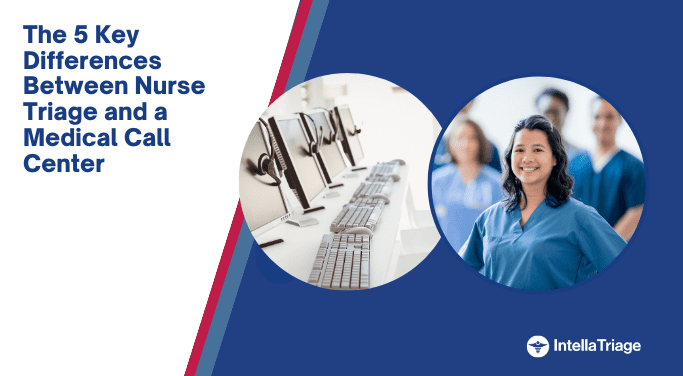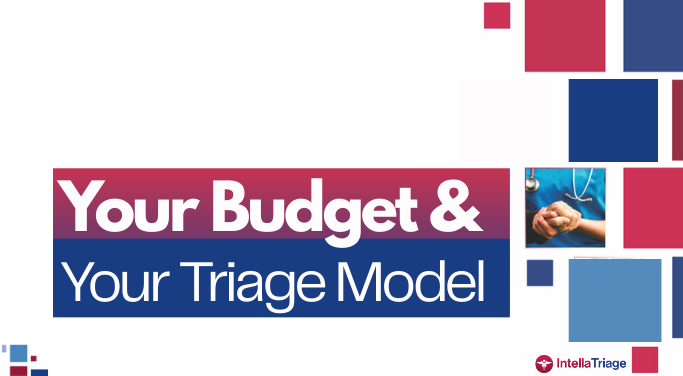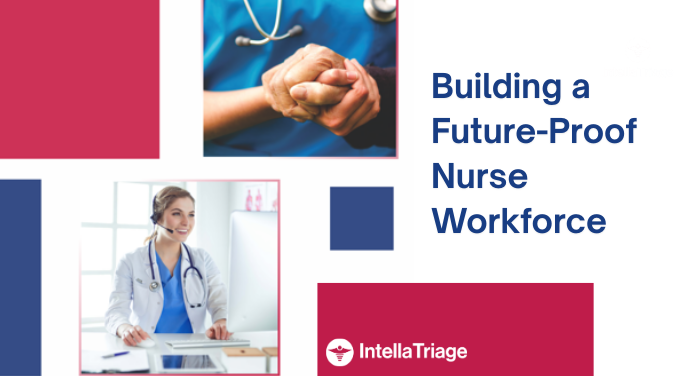Though many people use the terms interchangeably, nurse triage and medical call centers are not the same. In fact, they are considerably different. Call and contact centers are distinct models for business communication and share very similar characteristics, yet are vastly different from triage or other nurse-based services. In this blog, we explain exactly what nurse-triage and call centers are,. We will discuss how each serve their populations and the key differences between them. Then we will help you determine which is right for your organization.
What is a Medical Call or Contact Center?
A medical call or contact center is an office setting where non-clinical agents handle inbound, outbound, or blended phone calls. They typically have on-premise hardware and telecommunication infrastructure to send and receive a high volume of calls. Call centers are geared toward taking inbound patient calls and forwarding them to the healthcare provider’s clinical staff. When the provider’s staff isn’t available, the call or contact center employees take a message and forward that to the provider for a response the next day. This model is inefficient and doesn’t provide the value or care the patient seeks when they need it.
Call and contact centers traditionally focus on driving down costs by reducing the number of agents they have on staff and trying to push as much volume to those agents as possible. Typically, they will push agents to resolve calls faster and answer more calls per shift. Sometimes, call centers have installed an interactive voice response (IVR) system that keeps customers from talking to a real person or caregiver. These factors cause frustration and lead to a poor patient experience.
What is Nurse-Based Triage?
Nurse-based triage providers handle inbound and outbound calls and serve patients after-hours. This allows agencies to provide care for patients 24 hours a day, seven days a week. With their medical training and experience, these nurses provide patient support over the phone, reducing the number of calls routed to the on-call staff. This, in turn, allows staff time for much-needed rest and recuperation, leading to reduced levels of burnout. Using care directives set with your clinical team, triage nurses operate within your protocols and systems. In addition, triage nurses can access your EMR, allowing them to review each patient’s record in real-time and provide proper guidance. Thereby, triage nurses act as an extension of your team, providing a consistent experience for the patient, no matter where the encounter begins or ends.
Five key differences in the triage and medical call center models:
-
Patient Access to Care
With new technology and analytics, serving patients can go beyond answering inbound encounters. Basically, high-level awareness of patient status makes it possible to reach out and proactively service a patient before an emergency call comes in.
Triage solutions give patients access to professional medical care on the first call, every time they call. Only if the patient’s concern is outside of the nurse’s scope or an in-person visit is needed is the on-call staff contacted. With medical call centers, the on-call staff is contacted every time a patient calls, plus patients experience delays in receiving care.
-
Empowering Patients to Do More
Call and contact centers can make it hard to speak to a live nurse or physician. On the other hand, triage providers connect directly to the patient and are ready to intervene to provide the best course of care possible. Whatever the method, self-service lowers the time patients and caregivers have to spend on the phone, which reduces costs and wait time.
-
Analytics and Reporting
On-call patient encounter data, such as call volume and encounter type, provides deep insights into your organization’s operations. The best nurse triage services record every interaction for quality assurance purposes. With proper documentation, triage services can provide key insights into what happens on each call. Most often, agencies leverage these records throughout the organization to optimize care and improve the patient experience.
Patient experience is not top of mind for call centers. Instead, the goal of the call is to transfer or take a message, so valuable insights cannot be determined, nor is continuity of care supported.
-
Advanced Routing to the Right Nurse or Physician
Triage nurses can handle a significant percentage of calls. When necessary, nurses will escalate the situation to the appropriate skilled caregiver. It is easier to route patients when patient medical information is accessible. Pulling data directly from the EMR empowers triage nurses with the information needed to make care decisions from the first call.
Patients want their concerns addressed quickly. It can be extremely frustrating spending extra time defining a problem to multiple people. Also frustrating? One phone call, multiple transfers. This is often the case with call centers. Conversely, triage service models route patient encounters more quickly and accurately than call or contact centers ever could.
-
Better, Consistent Patient Experiences
Lastly, with effective training, customer profiling, and patient experience strategy, exceptional patient encounters are possible with nurse-based triage services. Regardless of how patients engage with providers, they expect a certain level of service from whoever is on the other side of the encounter. It is up to providers to prioritize the patient experience and put measures in place that support their needs.
Nurse triage providers like IntellaTriage prove that continuity of care is possible.
Nurse Triage vs. Medical Call Center: Which is Better?
The main difference between nurse triage and medical call/contact centers lies in the patient experience. With a call center, patients reach non-clinical resources, then hope to receive a call back soon from a clinician. A triage provider puts your patients in direct contact with a live caregiver on every encounter. IntellaTriage is an all-in-one solution that transforms after-hours care delivery through well-trained registered nurses. Contact us today to learn more about what IntellaTriage can do for your organization – improve the patient experience and boost your bottom line.
Contact Us for a Consultation
Ready to optimize your triage process? Reach out to us today for a consultation tailored to your needs. Let’s elevate your patient care together.
More From The Blog
Home health and hospice leaders know the strain of delivering quality care 24/7 with shrinking staff, rising patient volumes, and growing oversight. One strategy many haven’t fully leveraged yet is after-hours triage. A nurse-first triage model is about more than answering calls. Outsourcing your nurse triage function is a strategy that saves money, strengthens staff [...]
As post-acute care evolves under the weight of rising patient volumes, persistent staffing shortages, and the increasing complexity of care at home, one thing has become undeniably clear: nurse-first triage is an invaluable piece of the care-at-home puzzle. At IntellaTriage, we've spent the last 16 years proving that. From our earliest days in 2008, our [...]
In hospice and home health, nurses are the lifeline of care. But with higher acuity in the care-at-home patient population, mounting documentation demands, and a growing aging population, field nurses are stretched thin. The stakes are high for today's care delivery, but for the future of the profession itself. Persistent Post-Acute Trends Worth Paying Attention [...]

